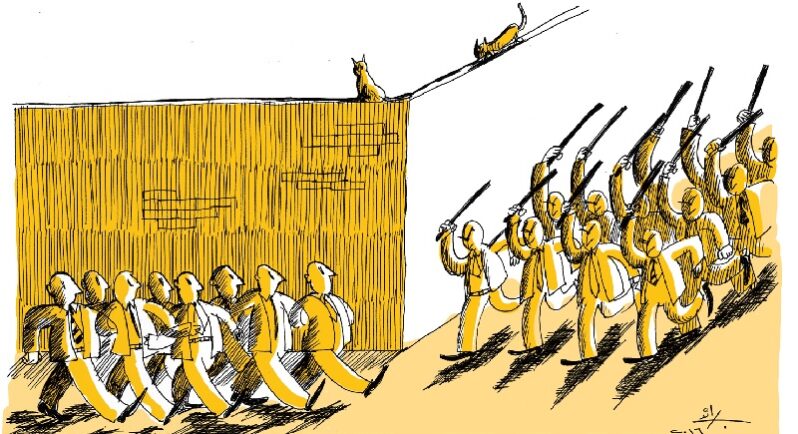Combating Corruption in Egypt (II): Making an Example of Hesham Geneina

Following the January 2011 revolution, Egyptian oversight bodies have regained some of their roles after liberating themselves from the National Party’s control over the regulatory and accountability bodies over the past three decades. For example, the administrative monitoring reports contributed to the institution of the ruling against former President Hosni Mubarak and his two sons in the case known in the media as “the presidential palaces”. The revolution has also enabled the oversight bodies to do their role in exposing corruption. This article will present the case of Hesham Geneina, former head of Egypt's Central Auditing Authority (CAA). On July 28, 2016, the New Cairo Criminal Court issued a sentence of one year imprisonment and a fine of LE20,000 [US$2,252] on charges of spreading false rumors on corruption. The court also set a bail of LE10,000 [US$1,126] to suspend the sentence.
Perhaps the concurrence between the reconciliation with fugitive businessman Hussein Salem and the imprisonment of Hesham Geneina may clarify the manner in which the executive authority exploited its legislative power during the transitional period, to fortify and protect the corruption circles which have spread through all of the state’s organs. In parallel with the four laws passed to enable the executive authority to reconcile on public fund wasting and encroachment cases, it also passed laws that would enable it to fully control the oversight bodies. By this, the executive authority has thrown the Constitution out the window, dragging these bodies back to a status worse than that before the revolution.
Constitutional Guarantees Imposing a New Reality for Oversight Bodies
The 2014 Egyptian Constitution provides for a wide range of powers and guarantees that maintain the independence of this apparatus, especially before the executive authority. The Constitution provides that oversight bodies shall enjoy a legal personality, as well as technical, financial, and administrative independence. The Constitution obligates the legislative authority to consult with the oversight bodies on draft laws and regulations related to its field of work.
Moreover, the constitutional legislator stipulated that the president of the state is the one who has the power to appoint members of these bodies, provided that the majority of Parliament members grant their approval. The Constitution also gave these bodies the right to lodge complaints to the competent authorities based on any evidence of wrongdoing or crimes. This confirms that the new Constitution served to activate the roles of oversight bodies in their fight against corruption.[1]
Using Legislative Power to Bring Down the Independence of Observatory Bodies
The executive authority did not stop at exploiting the legislative vacuum in the transitional phase to fortify corruption or reduce the possibility of prosecution thereof.[1] It turned to the only thing left to do on its part, namely to prevent the observatory bodies from doing their role. This happened clearly following Geneina’s insistence on doing his job by reporting over 107 corrupt incidents which emerged during his term of office. Therefore, President Abdel Fattah al-Sisi issued Law No. 89 of 2015 on cases of dismissing the heads and members of independent and oversight bodies. Such law has granted the president the right to isolate the heads of regulatory authorities. The law identified four conditions under which dismissal is possible.
If there exists serious evidence affecting the security and safety of the state against the president of the respective body;
Disreputability and loss of Trust;
Failure to carry out their duties properly, affecting the higher interests of the state or a public legal person; and
If they no longer meet one of the conditions of their position for non-health reasons.
From the above-mentioned four cases that require dismissal of the heads of oversight bodies, it is clear that the text of the law thereon is quite broad. Moreover, there can be no clear evidence of whether or not these conditions have been met; and that by itself is considered an attack on the independence of these bodies, rendering such law unconstitutional.
Using the Law to Exert Control over Oversight Bodies (The CAA as an Example)
The legal framework has then become a tool for besieging the heads of oversight bodies and affecting their independence; which is what quickly happened to the CAA. In 2015, the Ministry of Planning prepared a study to analyze the costs of corruption in Egypt, estimating this cost at about LE257.7 billion a year. After the study was completed, the Minister of Planning asked the CAA to audit it. Based on this request, the CAA started working on it. On December 23, 2015, Egyptian newspapers published statements attributed to Geneina, indicating that the cost of corruption for the year 2015 was LE600 billion. In an official statement issued on the morning of December 26, 2015, a spokesman for the CAA rushed to deny the rumors, emphasizing that the mentioned amount is the result of a 4-year period of corruption, from 2012 to 2015. This means that the result reached by the CAA was less than the Ministry of planning had estimated in its study.
However, apart from whether or not the stated figures were accurate, the executive authority did not seem happy about making them public. On the evening of the same day, December 26, the Presidency published a press news release stating that the president of the republic issued a decree to form a fact finding committee to investigate these statements. The committee was to be headed by the president of the Administrative Control Authority. Members would include representatives from the ministries of planning and finance, interior and justice, and Deputy Chairman of the CAA Hisham Badawi. What happened reveals that the head of the executive authority took action to address remarks that talked about corruption and the size of it. The president of the republic used his powers -as the head of the executive authority- to take a measure contrary to the provisions of the Constitution; while the Constitution and the law have granted all the safeguards that maintain the independence of the CAA, the president of the republic issues a verbal decision without any legal justification or factual document to establish an administrative committee that monitors the work of the CAA, and investigates the extent of credibility of its reports. It is worth mentioning that this verbal decision was not published in the Official Gazette.
On January 12 and as was expected, this illegally-established committee published a report denying the information included in the CAA reports. This report came out in record time, in less than 15 days, and was circulated to various media outlets. Geneina responded by refuting this report, stating that it lacks professionalism. Afterwards, the Public Prosecutor blew a big surprise by issuing a decision to ban publication with regard to these statements. On March 28, 2016, Geneina was sacked from office. After the decision to remove him was implemented, his daughter was dismissed from her work in the administrative prosecution on May 29, 2016. To top it all off, a decision was issued to convict him for spreading false news and to imprison him for the above-mentioned reasons.
The actions of the Egyptian government against Geneina on the one hand and the concessions it offered to Hussein Salem on the other, clearly illustrate the policy of post-revolution governments towards the issue of transitional justice. It exposes the direction [of its policies], namely the protection of corruption and the restriction of any action that conflicts with its interests, and with those who benefit from these circles of interest inherited by the Egyptian revolution from Mubarak's regime.
This article is an edited translation from Arabic.
__________
[1] See the texts of Articles 215, 216, 217, 218 and 219 of the Egyptian Constitution promulgated in January 2014.
[1] For part 1 of this article: Hyperlink.



